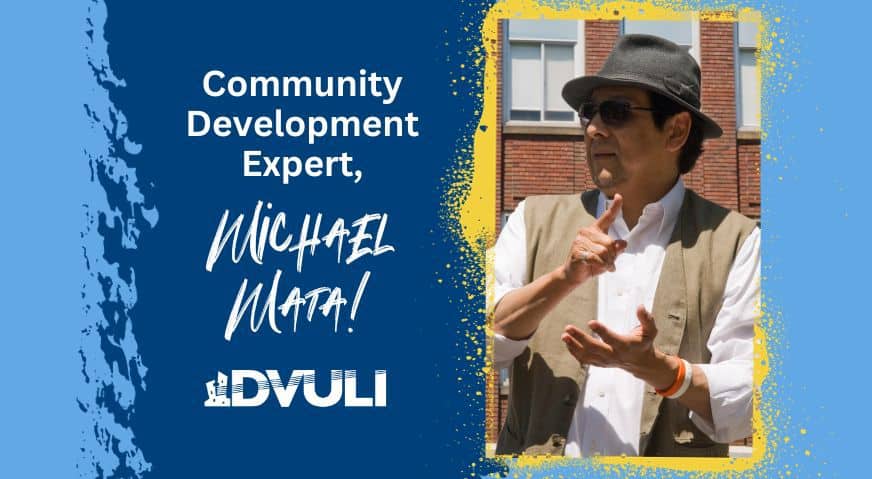Mapping Out Michael Mata’s Own Unique Assets
Posted by: DVULI | December 5, 2023

By Gerald Bell (Kansas City 2003)
One conversation with veteran leadership trainer Michael Mata, and there’s no denying you’ve tapped into a fountain of resources. For close to a half-century, Michael’s acute focus on community development and the equipping of leaders has prompted major institutions and organizations like DVULI to keep him on their radar.
At the recommendation of former DVULI program director Noel Castellanos, Michael met with Ginny Vander Hart and Eileen Kooreman a year after DVULI was launched to discuss his expertise in planning and development, as well as his work as a college professor. In this meeting, Michael was intrigued by the mission of empowering leaders who work with underserved youth with tools likely found in higher education or other training establishments but with a unique design.
“I was interested right away,” recalls Michael of how Ginny and Eileen described DVULI. “When [they] began to hint at the kind of things that were beginning to happen, it impressed me. I told people that they (DVULI) are providing blue chip training for these very marginal ministries that need help for long-term sustainability and impact.”
With his background in raising resources and convening local and national influencers, Michael was certain he would be asked to instruct DVULI’s Resource Networking workshop. However, after hearing his stories, the team concluded that Scenario Planning was a better fit for him. Although he was unfamiliar with the term Scenario Planning at that time, the work he was engaged in clearly aligned with the concepts taught in the module.
A few years later, Michael was asked to take on the Community Youth Development workshop. Content such as the “Web of Life” and “Asset Mapping,” among other elements, proved to be sweet spots for him as a DVULI facilitator. In addition, the community walks to exegete the sights, sounds and smells of a neighborhood were highly esteemed experiences for participants learning under Michael’s leadership.
“I want to see a difference made not only in the lives of the individual [leaders] but also in the lives of young people,” offers Michael, who was a Nazarene Church youth pastor before expanding to other disciplines as co-pastoring, community development, and higher education. “When I worked with the young people in my church, I realized it was possible to impact more youth than those who were members of my congregation.”
To date, Michael is the only DVULI trainer to facilitate three of the five local workshops the program delivers. Most others facilitate one. He relishes being in spaces among leaders who love God, are passionate about reaching youth, and are eager to learn. With a curriculum vitae loaded with extensive involvement in key decision-making committees and significant achievements, what’s important to Michael in the learning environment is that students apply what they have learned.
Because DVULI addresses the personal and organizational components of its constituents, Michael found this even more attractive and is, in part, why he willingly returns to train at the request of the staff. Clearly, he embraces the mission of DVULI and embodies the kingdom qualities necessary to thrive as a leader, making him an asset to the program.
When asked what sustainability principles a community leader should apply in a post-pandemic era, Michael quickly responds with a beaming grin, “That is an excellent question. Next!”
Humor aside, Michael offers four sustainability tips that align with the tools presented to participants in DVULI:
-
Self-care:
“A lot of our people come from marginalized communities, and often that means people of color. Then those in the church have heard it’s all about ministry, ministry, ministry. Taking care of ourselves and our family is first. Knowing we are nurturing our spirit, soul, mind, and even our body is most important.”
-
Don’t serve alone:
“You might have the brilliant idea to create your own nonprofit or ministry, but it’s best done in collaboration with others. See yourself as part of the larger movement of God in community. It isn’t about if you can raise a million-dollar budget. Whatever small role you play is significant to the bigger picture.”
-
Have community-wide impact:
“This takes a lot of time. Change happens at the rate of trust. So, develop trust in others to have a community-wide impact and move beyond just institutional building. Remember, ultimately, it is God who gets the glory.”
-
Lifelong learning:
“Developing skills looks different now than it did years ago. One of the things I appreciate about DVULI is the staff’s willingness to listen, learn, and adapt to the changing needs of leaders. That could mean learning from mistakes or even falling short, but being a learner is important.”
In a caring tone, Michael further cautions leaders not to settle for only learning new information but to go deeper in knowing what to do with it. “There’s knowledge and there’s application,” he notes. “There is also a bridge between the two, which is the element of ongoing coaching to help individuals take the material they’ve received and know when and how to apply it to their context.”
Referencing author Tim Soerens’s resource, Everywhere You Look: Discovering the Church Right Where You Are, Michael urges ministry leaders to discover where God is already doing the work and to come alongside it.
“It’s not about you being the pioneer. The work might be in areas you don’t always think about,” he reasons. “The church is beyond the facility itself, so it’s not about attracting youth to your church.”
Michael continues, “My good friend Father Greg Boyle sums up what I have come to understand about young people: ‘These so-called forgotten, disregarded individuals, who society sees as troubled and problematic, already have a sense of the divine. It’s really us helping them to discover for themselves that they are precious in God’s sight.'”
# # #

